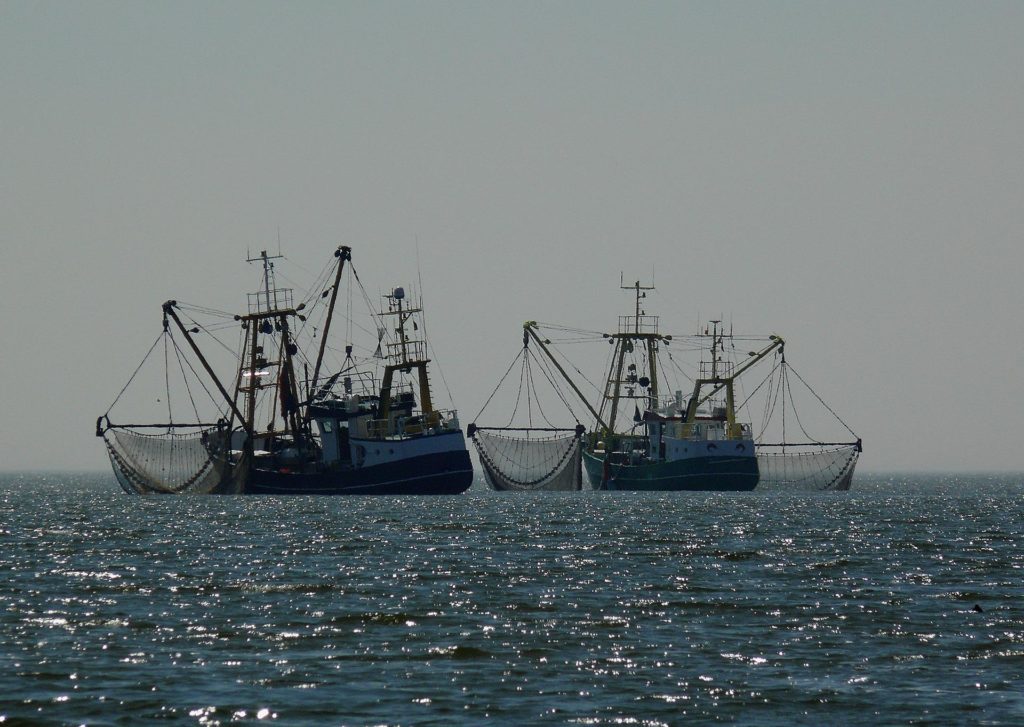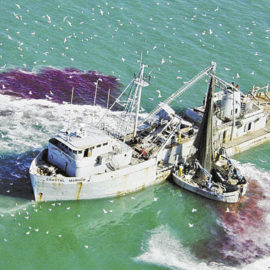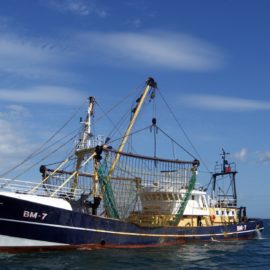
Louisiana stands alone of the states on the Gulf in unlimited menhaden catch. Only the industry is happy.
The latest effort to rein in Louisiana’s largest but least-regulated fishery was snuffed out by a Senate committee this week. The bill would have placed the state’s first catch limits on menhaden, a small schooling fish that serves as a key food source for larger fish, birds and marine mammals. Menhaden is also Louisiana’s number one catch, with more pounds of menhaden, also called pogy and fatback, taken from state waters each year than shrimp, crab and oysters combined. Much of the menhaden catch is ground up into fertilizer, pet food and livestock feed. House Bill 1033 passed the House of Representatives last month and was supported by several conservation and recreational fishing groups concerned that the largely unchecked fishery is taking food from other species like speckled trout and dolphins, which have suffered population declines in recent years. They note that all other Gulf of Mexico states either prohibit or strictly limit the menhaden industry. “We’re the only Gulf state to allow this industry,” said Benjamin Graham, a member of the Louisiana Finfish Task Force, which advises state agencies on fishing matters. “When we’re dead last on something, we should probably re-evaluate.”
nola.com
Two foreign companies that dominate the Louisiana catch oppose the bill and of course used money, I guess, to sway the vote.
The bill was strongly opposed by the two foreign-owned companies – Omega Protein of Canada and Daybrook of South Africa – that dominate the Louisiana menhaden fishery, which has produced an annual catch worth an average of $80 million since 2010. Daybrook’s representatives warned the bill would have forced the company to close its menhaden processing plant in the small Plaquemines Parish community of Empire. “The current level of harvest is very minimal when compared to harvest levels of similar species throughout the world and therefore unlikely to cause an impact on the ecosystem,” said Shane Treadaway, a Daybrook manager. State Department of Wildlife and Fisheries officials said the industry doesn’t appear to be harming other species, but admitted it lacks comprehensive or recent data on ecosystem impacts. Rather than outright reject the bill, the Senate Natural Resources Committee on Thursday opted to starve it of time, voting 4 to 3 on its last meeting of the 2022 legislative session to defer it to a future meeting that has no chance of taking place in the final week of the session. Rep. Joseph Orgeron, a Republican from Larose and the bill’s prime sponsor, was puzzled and disappointed the committee used a “procedural move” to kill the bill rather than vote to reject it. “I guess they thought this was a cleaner death,” Orgeron said.
The head of the committee is one who oppose the ban as one of the plants is in his district.
Sen. Bob Hensgens, the committee chairman and an opponent of the bill, did not return calls for comment. The Republican from Abbeville represents a district with the state’s other menhaden processing plant. The Omega Protein plant provides about 270 jobs in Vermilion Parish, and some or all of them could be in danger if the industry is forced to curb its catch, Hensgens said earlier this month. Orgeron agreed to ease some of his bill’s geographic restrictions and boost the catch limit from 573,000 pounds per year to 860,000 pounds, an amount that reflects the industry’s largest catch level in recent years. “But even that wouldn’t make them happy,” he said.
The state says there is a half-mile barrier to fishing but that is not true.
Hensgens and Wildlife and Fisheries officials erroneously stated that Louisiana already has a commercial menhaden no-fishing zone that extends a quarter mile from the coast. “Absolutely we do,” Wildlife and Fisheries Assistant Secretary Patrick Banks told senators on Thursday. But agency officials confirmed the rule hasn’t been finalized and may not go into effect until later this summer. Proposed last year and backed by the industry, the rule has been delayed and scaled back in recent months to exclude restrictions in Breton and Chandeleur sounds, a move that was opposed by St. Bernard Parish. While the rule doesn’t yet apply to the industry, a Wildlife and Fisheries spokesperson said the industry has offered assurances that it is voluntarily adhering to the future rule. Recreational fishing groups say the quarter-mile rule will have little impact because most menhaden fishing happens between a half-mile and three miles from the coast. Banks bristled at the notion that his agency isn’t adequately regulating the industry. Noting the word “menhaden” appears in state regulations dozens of times, he listed licensing requirements, bycatch standards, gear rules and fishing limits in non-coastal waters as proof the agency is managing the industry. Sen. Sharon Hewitt, a Republican from Slidell, didn’t buy it. “It doesn’t seem like you’re doing anything, really,” said Hewitt, who voted against the bill’s deferral. “I know you say you regulate because (menhaden) shows up in the statute 58 times or something, but in terms of understanding how it affects the rest of the ecosystem or managing the amount of menhaden you take out of the Gulf, I don’t really see where you’re doing anything to manage that.”
Orgeron has tried to get this bill passed before.
The bill is Orgeron’s second failed attempt to restrict the industry. Last year, he proposed a bill that would set a half-mile menhaden fishing exclusion zone, with wider buffers around some barrier islands. It also died in the Senate. He may try again next session. “I’ll probably keep pushing but until there’s regime change (in the Senate), I don’t know how much things can change,” he said.
What happens when the eventually over fish and there are no more? This has happened all along our countries coasts as if we want to fish we need to conserve.




Pingback:Pogie Boats Continue to Pound Louisiana Beaches and Shorelines this Summer